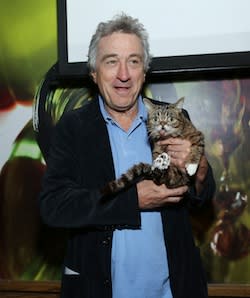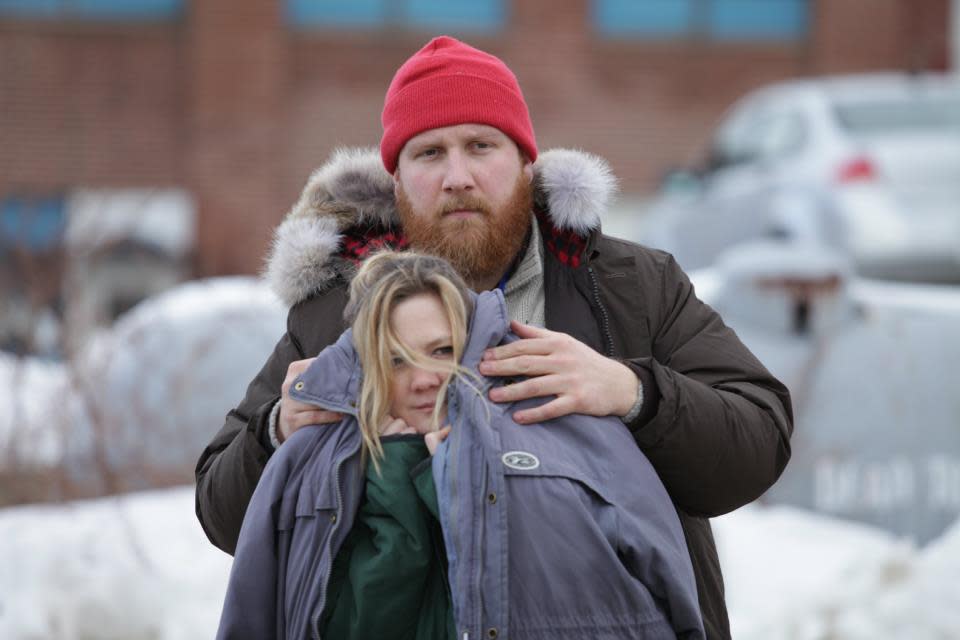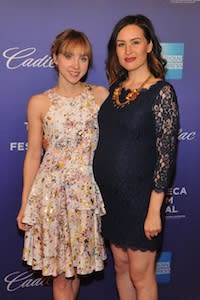5 Lessons From the Tribeca Film Festival
This year's Tribeca Film Festival began on April 17 with a rock 'n' roll movie, "Mistaken for Strangers," and had its official closing-night gala on Saturday with the appearance of Martin Scorsese, Robert De Niro and Jerry Lewis for a screening of the 1983 film "The King of Comedy."
In between, close to 100 features screened, a number of transmedia projects were showcased, Clint Eastwood talked about how film is still better than video, and the festival put on a day of sports films and a day of family films and a number of panels and discussions.
It's hard to draw any firm conclusions from a festival that runs the gamut from Elaine Stritch to Muhammad Ali, from the words of Gore Vidal to a Paul Verhoeven film whose script was crowd-sourced, from bleak little indies to outdoor screenings of "Beetlejuice" and "The Birds" and "The Smurfs."
But here are five things we learned at Tribeca.
1. The internet really loves cats.
You already knew this, didn't you? But if you needed any more persuading, the Tribeca Online Festival allowed viewers to screen three festival films and a number of shorts and vines online, and then to vote for their favorite – and it didn't come as much of a surprise that the winner was "Lil Bub & Friendz," Juliette Eisner's and Andy Capper's story of "the most famous cat on the internet."
The film beat out "Farah Goes Bang," Meera Menon's well-received comedy about a young woman who campaigns for John Kerry in 2004 and hopes to lose her virginity along the way, and Alex Mellier's tale of activist Kirsty Sword Gusmao, "Alias Ruby Blade: A Story of Love and Revolution," to win the Tribeca Online award.
"Lil Bub & Friendz" also provided the festival's top photo op, when a shot of TFF co-founder Robert De Niro holding Lil Bub (above) turned out to be lots more click-worthy than, say, shots of Clint Eastwood or Ben Stiller or other TFF luminaries.
2. A memorable subject is a good start to a great documentary – but it's only a start.
This year's Tribeca was full of docs about fascinating characters: writer Gore Vidal (Nicholas Wrathall's "Gore Vidal: The United States of Amnesia"), singer Elaine Stritch (Chiemi Karasawa's "Elaine Stritch: Shoot Me"), comics Moms Mabley (Whoopi Goldberg's "I Got Somethin' to Tell You") and Richard Pryor (Marina Zenovich's "Richard Pryor: Omit the Logic"), basketball player Lenny Cooke (Josh and Benny Safdie's "Lenny Cooke," below), Coney Island strongman Chris Schoeck (Dave Carroll's "Bending Steel"), big wave surfer Eddie Aikau (Sam George's "Hawaiian: The Legend of Eddie Aikau"), extreme skier Shane McConkey ("McConkey," by a quintet of directors), political cartoonish Herbert Block (Michael Stevens' "Herblock – The Black & the White"), and director Michael Haneke (Yves Montmayeur's "Michael H. Profession: Director"), among others.
In some cases, a fascinating subject makes for a fascinating movie: Neither "Gore Vidal" nor "Elaine Stritch" challenge their subjects, but the former is a strong, smart portrait of an outspoken and acidic social critic, the latter a moving and intimate look at a difficult and fearsomely talented woman.
But "Lenny Cooke," for instance, takes an intriguing story – a high-school basketball phenom who was once considered to be better than LeBron James – and spends so much time on game footage that it forgets to tell us the real story of why Cooke squandered his opportunities. His on-the-court talent comes across, and we get a clear and unforgiving picture of the current-day Cooke, overweight and underemployed, but the details of the temptations and missteps that led him awry remain frustratingly vague.
3. Bad economy = good movies, sometimes.
Indie directors are often fascinated with the lower class, with people eking out a hard scrabble existence in a devastated economic climate that leads to hopelessness.
Films that wallow in despair can be hard to take, but at Tribeca two of the most memorable movies – one a quiet narrative feature, the other a devastating documentary – zeroed in on the malaise that affects communities in the wake of the recession.
Lance Edmands' "Bluebird" (above) is set in a depressed mill town in the dead of winter, and follows the repercussions that come when a bus driver (a riveting Amy Morton) fails to finish inspecting her bus because she's distracted by a bird that's flown into the vehicle. It takes nerve and confidence for a first-time feature director to make a movie so resolutely quiet, grim and restrained, but Edmands and his fine cast (which also includes John Slattery and Margo Martindale) underplay everything and create a quiet but all-encompassing mood of despair.
The documentary "Oxyana" (below) is a different side of the story of the devastation wrought by economic collapse. Another first-time feature director, Sean Dunne, chronicles the small West Virginia mining town of Oceana, which has been swept by an epidemic of prescription-drug abuse, particularly the use of the pain-killer OxyContin. (Hence the town's nickname.)
Dunne doesn't step back and put the town's travails in perspective, though his documentary suggests that the collapse of industry, plus a history of mining companies encouraging their workers to take medication and stay on the job, has been responsible for ravaging the town. Mostly, his cameras zero in on a dozen brutally frank townspeople, who tell their stories of shattered lives spent searching for pills and going to friends' funerals.
Both "Bluebird" and "Oxyana" are bleak and cold and raw and beautiful; neither of them is an easy film to watch, but neither are they easy to shake.
4. Black comedies are a tricky balancing act, but it sure helps to have Zoe Kazan.
One of the mainstays of Tribeca is the indie comedy that finds humor in grim subjects; last year's Chris Colfer vehicle "Struck by Lightning" was a prime example. And the festival's closing-night attraction, the Martin Scorsese film "The King of Comedy," was a classic example of the genre.
And this year, the category has plenty of entrants, including "Adult World" (John Cusack as an embittered poet who grudgingly mentors wannabe poet and sex-shop clerk Emma Roberts), the Hollywood-set "Trust Me" (Sam Rockwell as a conniving agent), "Almost Christmas" (Paul Giamatti and Paul Rudd as thieves trying to go straight as Christmas-tree salesmen) and "The Pretty One" (Zoe Kazan as twin sisters, one of whom tries to assume the other's identity).
Hopes were high for "Almost Christmas," considering that the last film from director Phil Morrison was the Oscar-nominated "Junebug" eight years ago. But his second feature is curiously flat and unengaging in its story of sad-sack Giamatti trying to win back his wife and young son after serving a stint in prison. (It complicates matters that his wife has taken up with Rudd, his former best friend and the one guy who offers him a way to make money.)
The film was not well received at Tribeca, with Rodrigo Perez calling it "a mostly lifeless affair and a big misfire for Morrison." (His indieWIRE colleague Caryn James was one of the few to disagree.) Giamatti and Rudd ought to be a terrific team for dark comedy, and Sally Hawkins is generally a valuable supporting player, but all three cast members are ill-served by the material.
Actress Zoe Kazan, on the other hand, has sold dark comedies in the past – "Ruby Sparks," which she wrote and starred in last year, was touching and underrated – and she does it again in the delightful "The Pretty One."
Kazan plays twin sisters: the mousy, timid Laurel, who lives at home with her father and his new wife, and the vivacious "pretty one," Audrey. First-time director Jenee LaMarque (with Kazan in photo above) sets up a deft comic tone in the opening scenes, then shatters it with a moment of tragedy; it's a tribute to LaMarque's direction and to Kazan's touching performance that "The Pretty One" earns back the laughs that initially seem impossible to regain in the wake of the shock.
It's not easy to pull off a romantic comedy with such dark undercurrents, but Colfer did it last year with "Struck by Lightning," and LaMarque and Kazan do it with ease and charm in "The Pretty One."
5. Tribeca has a good beat, and you can dance to it.
The fact that Tribeca opened with "Mistaken for Strangers," a documentary about the rock band the National, was one sign that the festival likes its music. And the rest of the lineup was studded with films about music and dance, among them the Dutch drama "Broken Circle Breakdown," set in the world of bluegrass music, and "Greetings From Tim Buckley," about musician Jeff Buckley and his father, seminal '60s folkie Tim.
"Tim Buckley" is a narrative film that almost turns into a concert movie, with a lengthy recreation of the Tim Buckley tribute concert that marked Jeff's introduction to a larger audience; Daniel Algrant's movie sometimes hitches a ride on the spell cast by Tim's music, and Penn Badgley does a solid job portraying Jeff, though he often comes across as a morose whiner.
On the dance side, the documentary "Dancing in Jaffa" takes on the Middle East conflict by looking at a ballroom dancer who teaches mixed groups of Israelis and Palestinians. And "Flex is Kings" goes closer to home, providing a vibrant chronicle of the Brooklyn-based flex dancing competitions that gave at least one virtuoso performer a way out of a tough neighborhood and onto worldwide stages.
Even Tribeca's shorts had a strong music component. "Who Shot Rock 'n' Roll," for instance, tries to essentially tell the history of the music through rock photography; if it requires its share of generalities and oversimplifications to do the job, it packs a punch because of many marvelous images and a killer soundtrack
And in Jamie Chambers' "When the Song Dies," a handful of stark, mournful Scottish ballads illuminate the desolate landscape of southwest Scotland in a way that is exquisitely haunting.
Related Articles:
Tribeca 2013: Clint Eastwood Says Film Still Has the Edge Over Digital
Tribeca 2013: How Big Data Can Save Movie Marketing
Tribeca 2013: On 'Interactive Day,' It's the Who-Needs-Film? Festival



